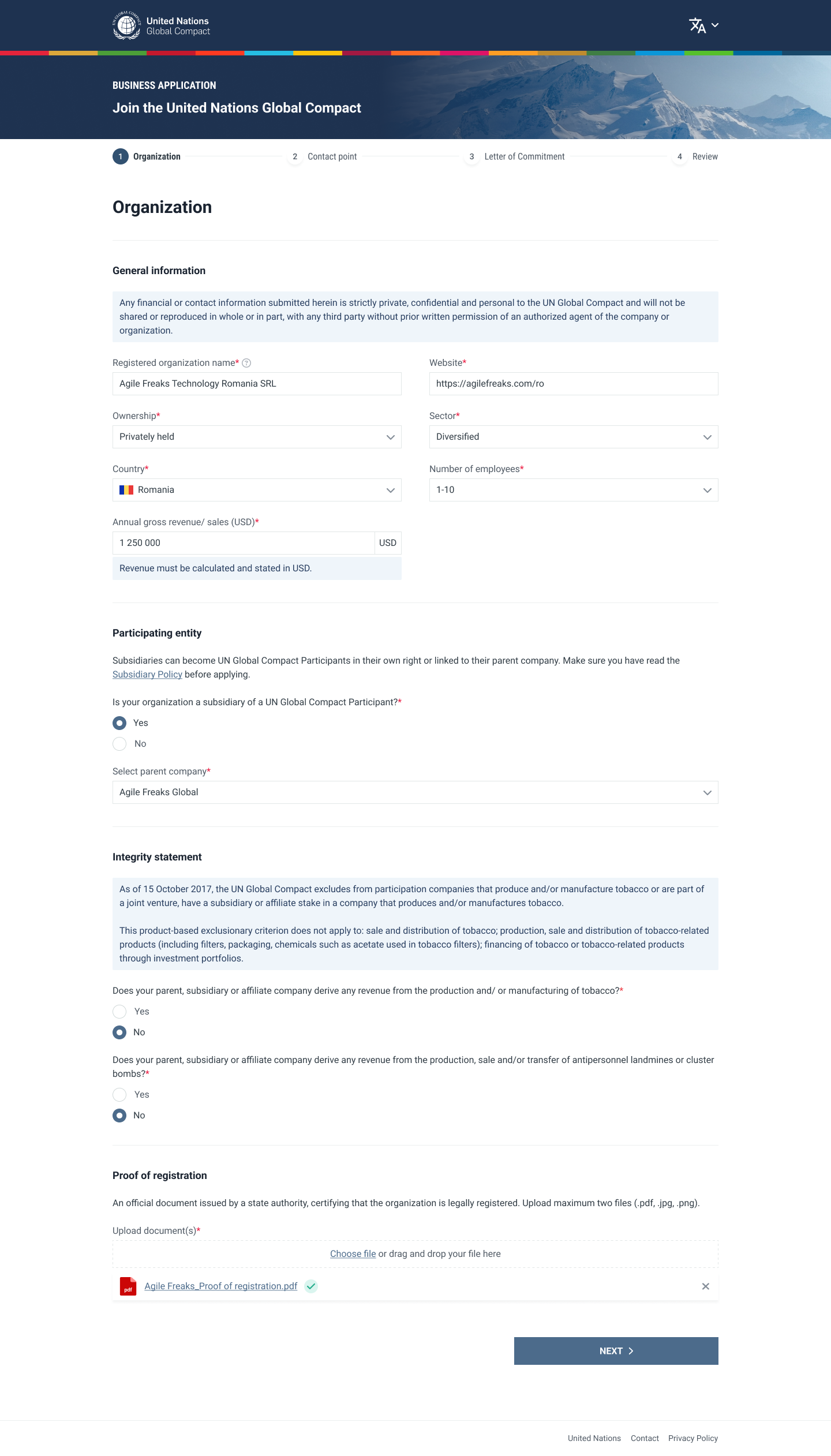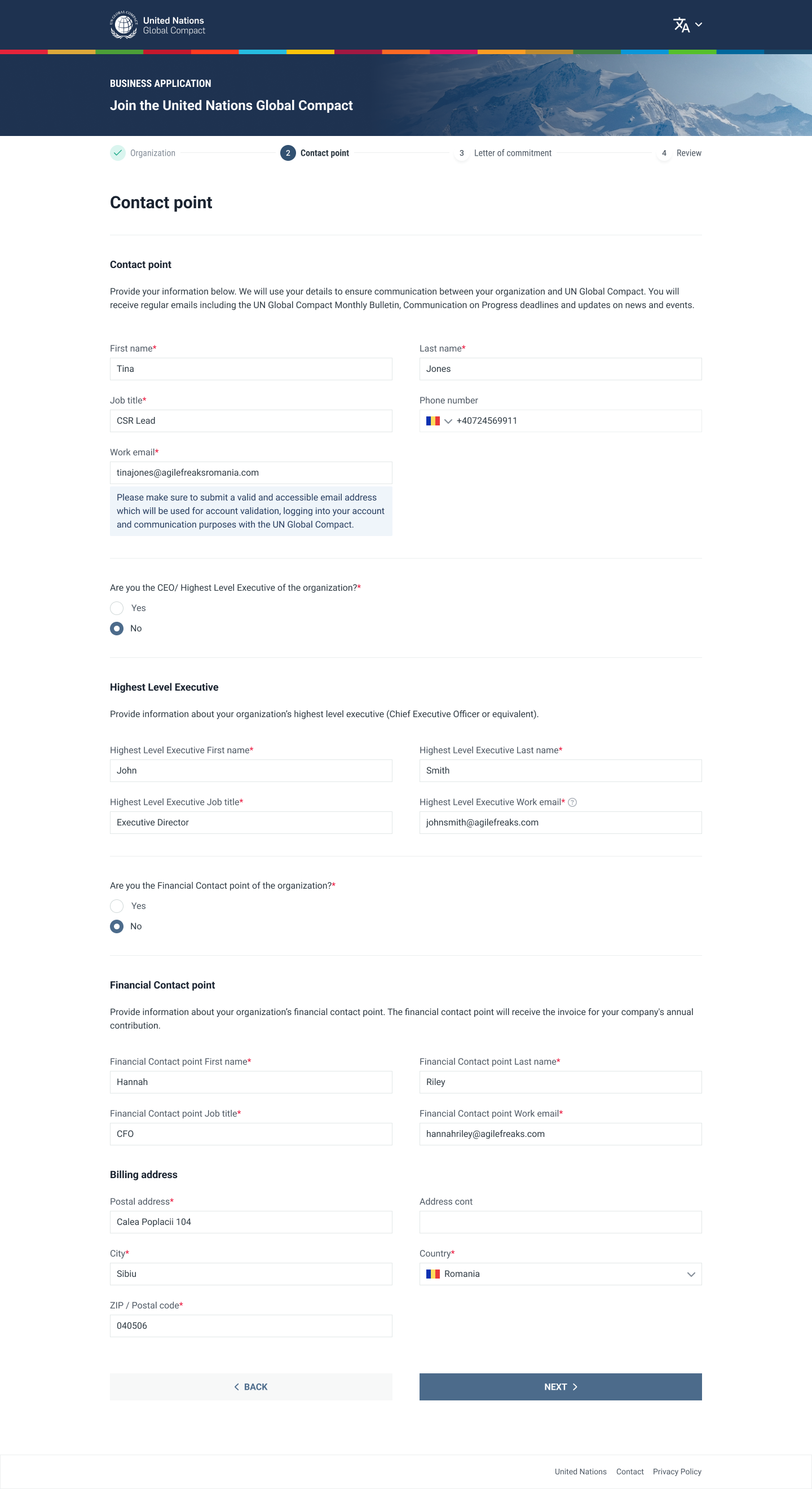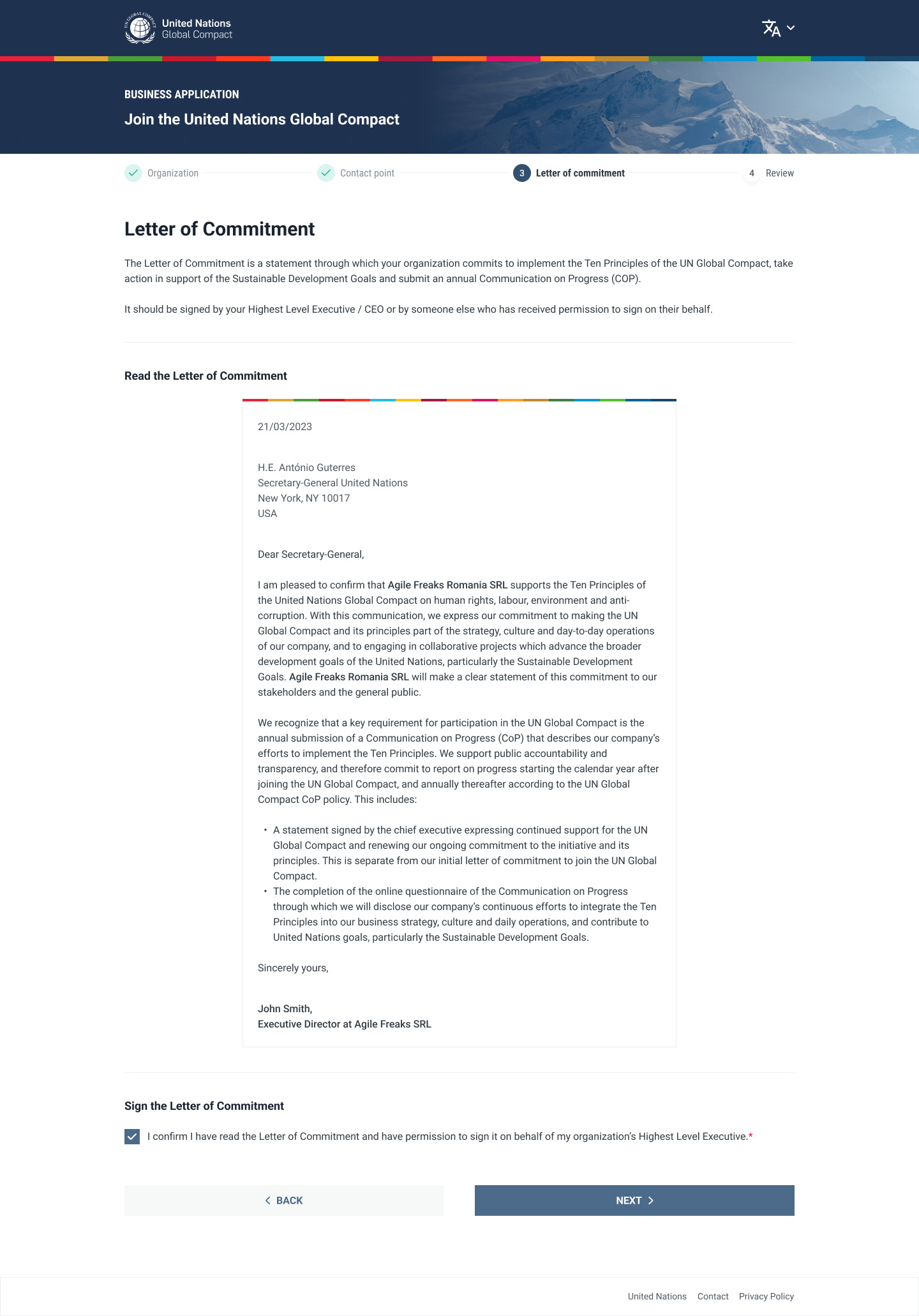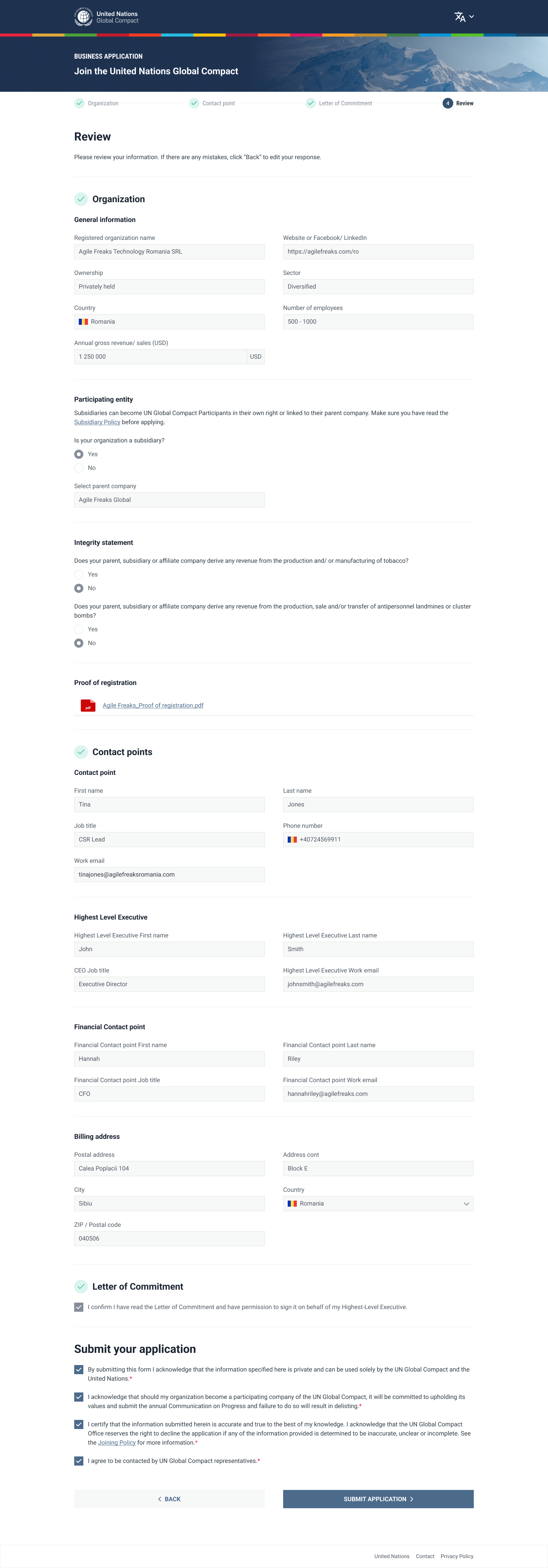Business application handbook

About the UN Global Compact
We welcome a wide range of businesses to join the UN Global Compact. Companies and Small and medium-sized enterprises (SMEs) can all make a commitment to a better world. We know that it takes collective efforts to make a difference for society. It doesn’t matter if you are heavily experienced in sustainability efforts, or just starting out. Our 20,000+ participating companies and SMEs have varying needs, and we’re prepared to support them all. We’re shaping a sustainable future, and you need to be a part of it.
Our participants include:
- Large multinational companies with operations in hundreds of countries
- Small companies located in under-developed or conflict-prone regions
- Businesses that rely heavily on suppliers based in markets where sustainability norms are sub-standard
- Foundations, non-governmental organizations and other non-business entities
Our participants represent diverse industry sectors, from construction and materials to financial services, support services, computers and electronics. They are located in 160 countries and collectively represent more than 58 million employees.
It’s good for business
Corporate and organizational success requires stable economies and healthy, skilled and educated workers, among other factors. And sustainable companies experience increased brand trust and investor support.
It’s good for society
Business really can make a difference. Companies offer fresh ideas and scalable solutions to society’s challenges – exactly what we need to create a better world. More than 20,000 business participants and 3,800 non-business participants in the UN Global Compact are already changing the world. They’re helping alleviate extreme poverty, address labour issues, reduce environmental risks around the globe, and more.
Communication on Progress (CoP)
What is a CoP?
Reporting to stakeholders in a transparent and public manner is fundamental for companies committed to sustainability. Your company’s annual Communication on Progress (COP) is a key component of your commitment to the UN Global Compact.
The UN Global Compact requires participating companies to produce an annual COP that details their work to embed the Ten Principles into their strategies and operations, as well as efforts to support societal priorities.
There are several powerful drivers of non-financial reporting that are pushing companies to act responsibly and report on their actions: Mainstream investors are considering environmental, social and governance (ESG) information in their strategies. Non-financial information is informing the decisions of consumers, local communities and civil society organizations that are all expecting greater transparency from business.
Once only a voluntary activity, there is a trend towards mandatory non-financial reporting. The COP serves as a good starting point, and in some cases meets government requirements.
How are CoPs used?
CoPs are made publicly available on the website of the UN Global Compact at the moment they are submitted by the participant, enabling companies to communicate their efforts to support and uphold the Ten Principles of the UN Global Compact.
Recent growth — both in terms of the sheer number of CoPs submitted and their sophistication — is largely driven by demand from key stakeholders including investors, civil society, Governments and consumers. CoPs provide stakeholders with information to make informed choices about the companies they interact with and stakeholder vetting is a cornerstone of transparency and disclosure as a means of driving performance. Use the participant search to find any CoP.
To learn more about submitting your CoP, click here.
Financial commitment
Why is it required?
The United Nations Global Compact is supported by the Foundation for the Global Compact, a U.S.-based non-profit that exists solely to provide vital financial, operational and programmatic assistance to the work of the UN Global Compact.
The Foundation’s relationship with the United Nations is set out in a Memorandum of Understanding (MoU). In accordance with the MoU, the Foundation’s main functions comprise:
- Fundraising to support the UN Global Compact
- Providing financial and programmatic support for the UN Global Compact initiative and its activities
- Promotion and advocacy of the UN Global Compact initiative and its Ten Principles
The Foundation was created in 2006 on the principle that public-private collaboration is essential to find lasting solutions to pressing global problems. In order to support the mission and vision of the UN Global Compact, the Foundation is authorized to raise funds from the global business community and broader private sector. Learn more about our finances.
In addition to fundraising activities, the Foundation provides general support to advancing the development of the strategy, programmatic offerings and global events of the UN Global Compact, including through provision of staff and other resources.
The Foundation for the Global Compact is proudly recognized as a Guide Star Exchange Gold Participant.
Incorporated under the laws of New York State as a not-for-profit corporation, the Foundation for the Global Compact is exempt from tax under section 501(c)(3) of the US Internal Revenue Service and qualifies for maximum charitable contribution deductions by donors where applicable. Our US Federal Tax Identification Number is 16-1756484.
Find out your annual contribution
Type-in your organization’s details below to find out your annual fee.
Background
The UN Global Compact is a voluntary initiative that seeks to mobilize companies and other stakeholders from around the world to align their strategies and operations with universal principles on human rights, labour, environment and anti-corruption, and take actions that advance societal goals. With a diverse base of businesses and non-business organizations, the UN Global Compact engages stakeholders at all levels of their sustainability journey to create a movement of transformative change.
Companies that join the UN Global Compact are committing to:
- Operate responsibly by embedding the Ten Principles of the UN Global Compact into strategies and operations
- Take bold, innovative action to achieve UN initiatives such as Sustainable Development Goals and the Paris Agreement
- Share their commitments and progress publicly through an annual Communication on Progress
- Advance the case for responsible business practices through advocacy and engagement with peers, partners, employees, clients, consumers, and the public at large
While the UN Global Compact does not have mandate to be a compliance or monitoring body, the initiative provides a platform for continuous improvement, public accountability, learning, and dialogue.
Eligibility for admission
The UN Global Compact is an inclusive initiative open to companies committed to implementing the Ten Principles of the UN Global Compact, and communicating on progress. To ensure the UN Global Compact Policies and practices safeguard the integrity and reputation of the United Nations and the values it upholds, the initiative maintains a few exceptions that restrict participation.
Applicants that meet the following exclusionary criteria cannot join the UN Global Compact:
- Subject to a UN sanction
- Listed on the UN Ineligible Vendors List for ethical reasons
- Derive revenue from the production, sale and/or transfer of antipersonnel landmines or cluster bombs
- Derive revenue from the production and/or manufacturing of tobacco
Any subsidiary, irrespective of their parent company’s participation, can apply individually to become a participant. Alternatively, subsidiaries may choose to participate through their parent company’s commitment, which applies to all subsidiaries and country offices.
If a parent company meets any of the exclusionary criteria, it will not be admitted to the UN Global Compact. Subsidiaries and affiliated companies can apply individually should they not meet any of the product-based exclusionary criteria. However, this exception does not apply if the subsidiary or affiliate is part of a corporate group that derives more than 5% of its revenue from the production of tobacco products.
Background
Companies joining the United Nations Global Compact commit to integrating the Ten Principles deep into their strategies and operations and to help make progress towards delivering the United Nations Sustainable Development Goals (SDGs). A company's commitment applies not only to the headquarters, but also to all subsidiaries, local branches and country offices.
A subsidiary can join individually irrespective of its parent company commitment
Subsidiaries can become UN Global Compact Participants in their own right. This can be accomplished by submitting their own application and CEO commitment letter to the United Nations Secretary-General. In this case, they are expected to make the standard global financial contribution.
These companies will be listed individually as Participants on the UN Global Compact website and annually communicate on their progress to implement the UN Global Compact principles and advance the SDGs.
A subsidiary of a company participating in the UN Global Compact can join linked to its parent company
If a parent company encourages its subsidiaries, they can join the initiative under the umbrella of that parent company in order to directly access both global and local engagement opportunities. In this case, they are expected to make the financial contribution that may be required by the Local Network in their geography.
These subsidiaries will have a profile on the UN Global Compact website and be included in the list of active UNGC companies. They will enjoy their own access to the UNGC dashboard, the option to submit a COP, or request the “We Support” UN Global Compact logo.
If a parent company prefers that its subsidiaries do not engage at the global or local level, subsidiaries will not have a profile on the UN Global Compact website nor be included in the list of active UNGC participants. They will not have their own access to the UNGC dashboard to submit a COP or request the "We Support" UN Global Compact logo. The parent company's annual Communication on Progress (COP) will cover activities of all subsidiaries.
Note: Within this policy, the term "subsidiary" is defined as a company controlled by another company in the sense that the parent can dominate the decision-making process of the subsidiary in relation to its financial and operating policies in pursuance of the objectives of the parent company.
1
Create your business profile
Enter information about your organization, including name, website, ownership, sector, country, number of employees, subsidiary details, revenue and upload a proof of registration.

2
Define the Primary Contact Point
The Primary Contact Point will ensure communication between your organization and UN Global Compact.
They will receive regular emails including the UN Global Compact Monthly Bulletin, Communication on Progress deadlines and updates on news and events.
Define the Highest Level Executive
We require you to provide information about your highest level executive (Chief Executive Officer or equivalent).
After your application is approved, this person will receive official documents such as policy updates, reports and invitations to special events via postal mail.
Define the Financial Contact Point
We require you to provide information about your financial contact.
After your application is approved, this person will receive the invoice for your annual contribution.
ℹ️ One individual can be a Contact Point, a Highest Level Executive and a Financial Contact Point in the same time. If this is the case, select "Yes" to both questions "Are you the CEO/Highest Level Executive of the organization?" and "Are you the Financial Contact Point of the organization?"

3
Digitally sign the Letter of Commitment
The Letter of Commitment is a statement of your organization committing to implement the Ten Principles of the UN Global Compact, take action in support of the Sustainable Development Goals and submit an annual Communication on Progress (COP).
This letter is automatically generated once you complete steps 1 and 2 of the Business Application Form.

In order to see how it looks like, you can download a template of the Letter of Commitment below:
4
Review your application

5
Setup your account
Once you submit your Application, please make sure to check your inbox, as you will receive an email through which you can setup your account with UN Global Compact.
You can find a detailed guide here
De-listing
The UN Global Compact is an inclusive initiative for companies that commit to align with the ten universal principles on human rights, labour, environment and anti-corruption. In order to maintain the integrity and reputation of the initiative, the UN Global Compact has developed criteria for de-listing participants.
Companies and organizations that are de-listed from the initiative:
- Will be reflected as such on the UN Global Compact website
- Will have all formal relationships with the UN Global Compact and/or Global Compact Network(s) terminated (whether held in an individual or company/organizational capacity - this could include, but not limited to, participation in an Expert Group, Participants or Patron Sponsors of Action Platforms and LEAD)
- Are not allowed to use the UN Global Compact name or logo, even if such permission had been granted prior to their removal
- May result in the forfeiture of financial contribution, including required annual contributions or contributions made to support any engagement opportunity such as Action Platforms, sponsorships, etc.
All companies or organizations that are no longer part of the initiative are given the status of ‘de-listed’, with a reason for de-listing, and it is reflected as such on the UN Global Compact website.
De-listings can either occur for integrity reasons or for administrative reasons, which are usually based on a request by the participant.
Integrity reasons for de-listing
Failure to communicate on progress
The UN Global Compact requires all business participants to submit an annual Communication on Progress (CoP) that outlines the company’s efforts to operate responsibly. If a company is unable to meet its annual submission requirement, it will be listed as ‘non-communicating’ on the UN Global Compact website. If the status persists for another year, the company or organization will be de-listed for failure to communicate.
Failure to engage in dialogue
Under the integrity measures’ dialogue facilitation process, participants are required to respond to third party concerns raised with the UN Global Compact Office within a two-month deadline. If a participant fails to respond within the required deadline, it may be listed as ‘non-communicating’ on the UN Global Compact website until such dialogue commences. If the status persists for a year, the company will be de-listed for failure to engage in dialogue. For more information, please read the Integrity Measures Policy.
Other reasons related to integrity
The UN Global Compact reserves the right to de-list participants for:
- Egregious or persistent misuse of the UN and/or UN Global Compact name and/or logo. The UN Global Compact reserves the right to refer cases to the United Nations Office of Legal Affairs
- Learning that after an applicant is accepted that the participant provided false or misleading information in the application form
- Suspension or removal from the UN Vendor List
- When egregious or systematic abuse of the Ten Principles is admitted by an authorized company representative or there is a finding of guilt in a court of law, as a last resort the company may be de-listed if their continued participation in the initiative is detrimental to the reputation and integrity of the overall UN Global Compact and its Local Networks.
Other reasons for de-listing
Participant requested withdrawal
The UN Global Compact is a voluntary initiative, and participants are free to end their participation at any time. Participants may decide to withdraw if they determine they are not in a position to continue their participation in their initiative or if they are unable to uphold their commitment to the Ten Principles. The Intention to withdraw should be communicated in writing by an authorized representative of the participating company or organization and specify the reasons for ending the commitment.
Merger or acquisition / Organization no longer exists
A participant no longer exists as a separate entity.
Consolidation of commitment under the parent company
A company’s commitment to join the UN Global Compact applies not only to its headquarters, but also to all subsidiaries, local branches and country offices. Parent companies that prefer that their subsidiaries do not remain individual participants of the initiative can consolidate their commitment. In this instance, the parent’s CoP is required to cover all subsidiaries’ activities. For more information, read the Subsidiary Policy.
Non-responsive
All business participants are required to make an annual financial contribution to the Foundation for the Global Compact based on their annual sales/ revenue in USD. Payment terms are 120 days upon receipt of invoice. After this time, the UN Global Compact reserves the right to de-list companies for failure to meet their annual financial commitment.
Re-joining
All participants de-listed from the UN Global Compact that wish to re-join the initiative will have to submit the below documents:
- Letter of Re-commitment to the UN Secretary-General from the chief executive (or equivalent) pledging to make progress on the UN Global Compact Ten Principles and take action in support of UN goals. The letter shall also include an explanation of the reason for de-listing along with corrective measures
- Valid CoP
The UN Global Compact reserves the right to request proof of payment for any outstanding invoice related to the required annual financial contribution.
The UN Global Compact will consider the following during the re-admission process:
- The results of a due diligence review
- The substance of the Letter of Re-commitment and COP
These additional documents/ criteria are required as applicable to the specific reason for de-listing:
Failure to engage in dialogue
Submit a response letter to the third party in the dialogue facilitation process.
Suspension or removal from the UN Vendor List
Submit proof or re-instatement in the UN Vendor database.
Other reasons related to integrity (Reputational concerns as a result of a finding of guilt or admission of wrongdoing)
All de-listings for this reason will be reviewed on a case-by-case basis.
The UN Global Compact generally recommends companies that are de-listed for this reason to wait at a minimum three years before re-applying in order to provide sufficient time to address the issues of concern. This requirement also applies to companies who decided to voluntarily withdraw for their inability to continue to uphold their commitment to the Ten Principles.
Re-admission will be based on a substantive review of the following:
Whether the CoP sufficiently describes actions taken to remedy the situation detailing alignment to the Ten Principles.
If applicable, the company should provide the outcome of an assessment conducted by a regulatory body or independent third party.
Other reasons related to integrity (Egregious abuse of the UN/UN Global Compact name or logo)
Submit clearance from the UN Office of Legal Affairs.
Non-responsive
Submit proof of payment for the forthcoming 12 months.
Product-based exclusionary criteria
Demonstrate that revenue is no longer derived from the production and/or manufacturing of tobacco.
Access resources
Understand more about your participation to the UN Global Compact.
Join UN Global Compact and shape a sustainable future
